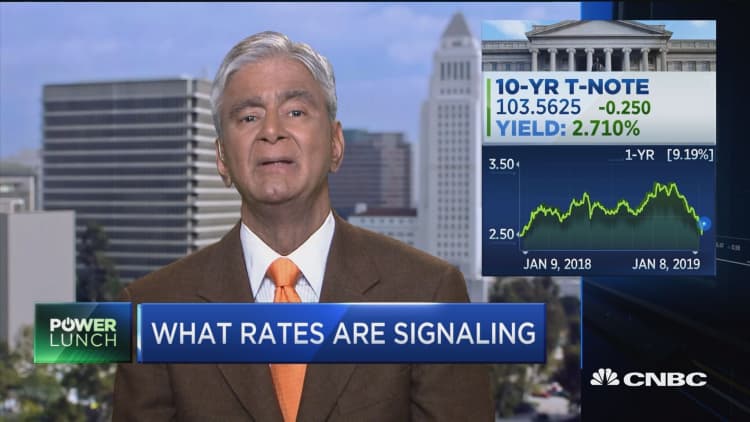
The bond market is warning a recession could start in the next 18 months, macroeconomic forecaster Komal Sri-Kumar told CNBC.
There are "danger signals," the Sri-Kumar Global Strategies founder said on "Power Lunch" Tuesday, referring to the phenomenon known as the inverted yield curve, when rates on longer term bonds are actually lower than shorter term ones. That's happening at the shorter end between 2-year and 5-year Treasurys while the spread between the 2-year and 10-year is razor thin.
The 2-year and 10-year spread should invert by the end of this year, predicted Sri-Kumar, whose consultancy advises multinational firms and sovereign wealth funds on global risks. That means "we are talking about a recession, if not by the end of this year, by the middle of 2020 to begin," he argued.
Concerns about an inverted yield curve giving way to recession puts Sri-Kumar in conflict with DoubleLine Capital CEO Jeffrey Gundlach. In his 2019 outlook, Gundlach, the so-called bond king, said he believes the yield curve will flatten but then steepen again before a recession actually begins. But Gundlach expects higher yields will hurt stocks in a "tug of war."
Sri-Kumar on Tuesday was also critical of the Federal Reserve for raising interest rates last year with inflation still so tame, saying the market is "yanking the Fed's chain" by telling central bankers to stop increasing short-term rates. He believes the Fed won't go through with the two rate hikes that it projected after last month's monetary policy meeting, which ushered in the fourth rate increase of 2018.
"[But] even if they back off and don't increase rates anymore, that is not going to help because you've had the negative impact of the rate increases along with very little inflation," he said. "That's going to do enough damage to the economy and that's what I think we are witnessing right now."


